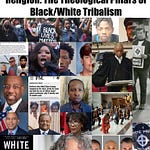Universalism is truly a wonderful idea and belief to ponder, especially thinking about the complexity of suffering, love, judgment and pain. It offers a theology that actually feels good and appears to be the least affixed to anything dogmatic, not forcing difficult conversations externally and internally while leaving aside deep dives into complex concepts like atonement, salvation, and the philosophical concepts of absolute truth.
The issue arises when Universalism is truly explored when juxtaposed against the concepts of sin and total depravity of humanity and the absolutes of truth when joined to Who Jesus truly was and is. Universalism allows for a relativism that removes so much of the honest research of Jesus, the scriptures, Christian doctrines, archeology and science. Universalism, when deduced to its raw foundation is a feelings-based theology that holds no weight against reality; it may feel good, but it leads to nowhere.
But with all of this truth, Christians have issues when dealing with people who ascribe to this theology, especially those who have left the Christian faith and assigned themselves to this new camp. What happens when we have to discuss theological issues with an individual who does not want to discuss the Bible; are you prepared to defend what you believe without relying on the text of scripture itself while leaning on other tangible resources that lead back to the text as foundation? Are you able to articulate what you believe because of personal study and are your prepared to do so as we face a much more secularized society?
We are to be students of our faith and my hope is that what you hear today guides you towards that and helps you to see that you don’t believe in some fairytale, or myth, or something that science disproves; you believe in the most concretely accurate and factual doctrine in human history and that spells transformation for you and anyone with a truly willing ear to hear. God bless your journey.
The Wry Pastor
Bible and Historical References:
John 14:1-11
8 Councils Protestants accepts
- Nicea - 325 AD (Jesus is God - against Arian Heresy)
- Constantinople - 381 AD (Doctrine of the Holy Spirit)
- Carthage - 397 AD (Canon of Scripture)
- Ephesus - 431 AD (Christ’s humanity - against Nestorianism Heresy)
- Chalcedon - 451 AD (Hypostatic Union - against Monophysite and Eutychian Heresies)
- 2nd Constantinople - 553 AD (Confirmed previous councils)
- 3rd Constantinople - 681 AD (Christ’s Will)
- Hiera - 754 AD (Rejection of icons/images)
Biblical Archeology
- Merneptah Stele
Historians, non-Christian and Christian, who confirm the existence of Christ and/or Christians in the 1st Century:
- Eusebius (Christian)
- Tacitus (Non-Christian Historian)
- Seutonius (Non-Christian Historian)
- Pliny the Young (Non-Christian Historian)
- Flavius Josephus (Possibly Christian)
Book against Atheism and Darwin’s Theory of Evolution
- Darwin’s Leap of Faith, by Ankerberg and Weldo












Share this post